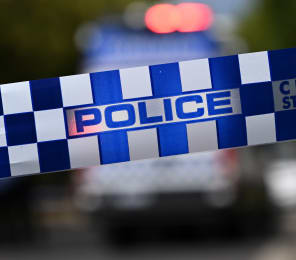IF YOU are in the practice of putting equipment batteries on the charge after using your drill, battery-powered lawn mower, leaf blower or whipper snipper and leaving them unattended for hours – don’t.
According to the Grampian Boulevard residents of a house in their Cowes’ neighbourhood which was all but destroyed by fire last week, equipment batteries, from a lawn mower and other garden equipment, likely started the fire.
“We were the first on the scene,” said a nearby neighbour.
“We saw the batteries on the bench on fire,” he said.
By that time the garage was fully alight, and their attention turned to the occupants of the house.
A man and a woman were at home at the time the fire started and while the woman escaped without injury, the man was affected by smoke inhalation and burns after returning inside several times to retrieve items and also to look for the couple’s two dogs.
Ultimately though, he was restrained by neighbours and emergency services people and taken to hospital. It has been reported that he is recovering well after treatment.
But the home has been extensively damaged.
Battery recharge warning
The Victorian Country Frie Authority issues warnings about recharging and storage of lithium-ion batteries.
“Many portable devices today are powered by rechargeable lithium-ion batteries. These types of batteries pose a higher risk of fire than others.
“Lithium-ion batteries are popular because they are light-weight and long lasting compared to other rechargeable batteries.
“You will find them in many devices such as phones, tablets, power banks, laptop computers, toys, appliances and tools, as well as mobility equipment such as e-bikes and e-scooters. They can also be found in many other modern devices that need power.
“Lithium-ion batteries release toxic and flammable gases when they short circuit, which may lead to them catching fire. If the battery is fully charged, violent fire behaviour with sparks and jet-like flames may be experienced.
“The main reasons lithium-ion batteries short circuit and catch fire - a process called thermal runaway - are because they:
- Are incorrectly charged using a charging cable that was not designed for the device or battery. This can result in overcharging or overheating.
- Have been damaged by an impact, cracked, dented, punctured, crushed or exposed to overheating.
- Have been in fresh or salt water for a long time, causing corrosion within the battery.
Don't help your devices to overheat
Devices left on soft surfaces like beds and couches can overheat and catch fire.
- Don't charge batteries or devices on soft surfaces such as beds, couches and carpet.
- Keep batteries and devices away from items that can easily catch fire like blankets, clothing and paper.
- Never charge a device under a pillow.
Don't leave charging devices unattended
There is a higher risk from fire if you are not in attendance or sleeping while devices are charging
- Avoid charging batteries or devices overnight.
- Avoid leaving batteries or devices unattended while they are on charge.
General charging safety
- Only plug in one device per outlet, and always keep power boards and cables neat and tidy.
- Don't use battery charging devices with worn or damaged cables.
- Always ensure the battery charger is switched off from the electrical power supply before connecting the batteries. This will minimize the risk of shock and sparking while connecting the batteries.
- Lithium-ion batteries can be sensitive to heat and therefore must be charged and stored in moderate temperatures.
- Never store or leave batteries and devices in areas where they can be exposed to heat or moisture.
- Do not leave devices such as phones, computers or charging devices in direct sunlight or in parked vehicles where they can quickly heat up.
- Larger batteries and equipment such as power tools and especially electric bikes, scooters or skateboards should be charged in the garage, shed or carport away from living spaces.
- Victorian fire services recommend that interconnected smoke alarms are installed in areas where devices are often charged.










